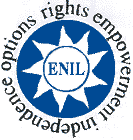© Independent Living Institute
Independent Living Institute,
Storforsplan 36, 10 tr
123 47 Farsta
Sweden
Tel. 08-506 22 179
info@independentliving.org

This page is from 1999.

In April 1989 at the European Parliament in Strasbourg over 80 persons with extensive disabilities coming from nearly two dozens of countries participated in a 3 day conference on personal assistance. Druing this event the European Network on Independent Living, ENIL, was founded.
ENIL was founded to address the under-representation of person with extensive disabilities (i. e. daily dependence on personal assistance) in disability politics, not the least within organizations of persons with disabilities.
The following document was adopted at a meeting of the European Network on Independent Living at 'Het Timmerholt', Netherlands, August 31 - September 3, 1990.
To build and co-ordinate a European Network on Independent Living.
1. To contribute towards the situation of disabled people through individual empowerment.
2. To work on building a European Network on Independent Living (ENIL).
3. To carry out educational events on Independent Living, e.g. seminars, workshops and development of resource materials.
4. To work on developing European concepts, principles and definitions related to Independent Living.
5. To promote the philosophy and concept of Independent Living among political parties, governments and other European bodies.
6. To seek funding for ENIL to carry out its activities.
7. To promote an understanding of Independent Living in Europe.
8. To facilitate information sharing on Independent Living.
While persons with disabilities use the term Independent Living, our goal is to participate equally in our communities - exercising our self-determination.
These principals are to guide the work of ENIL:
These above principles were adopted at the ENIL meeting, 'Het Timmerholt', Netherlands August 31 - September 3, 1990.
The above "Principles of Independent Living" were further elaborated at the following ENIL meeting in response to the increasing use of the term "Independent Living" by rehabilitation professionals.
Definition of the term "Independent Living" as adopted at the ENIL-meeting, Berlin 7. - 10. October 1992:
A disability exists, if essential, personal and social experiences are influenced by physical and mental limitations and their resulting discrimination.
Any organization, governmental or non-governmental including organizations for disabled persons, individuals and professionals who use the term "Independent Living'l in their work have to comply with the following principles:
a) to oppose all types of institutions,stationary or mobile, especially designed for persons with disabilities. An institution is any public or private establishment, organization or service which creates special segregated solutions for persons with disabilities in education, work, housing, transportation, personal assistance and all other areas of life, which by its nature limits disabled persons' possibilities to make their own decisions about their lives or reduces their opportunities to participate in society on equal terms.
b) In particular, establishments, organizations or services may not use the term "Independent Living", if they promote or accept personal assistance services that require the user to live in special dwelling units or which deny or reduce the individual user's right to full choice and control over his or her life by forcing the user to live by the routine of others.
Organizations may use the term "Independent Living" only, if all the following conditions are satisfied: